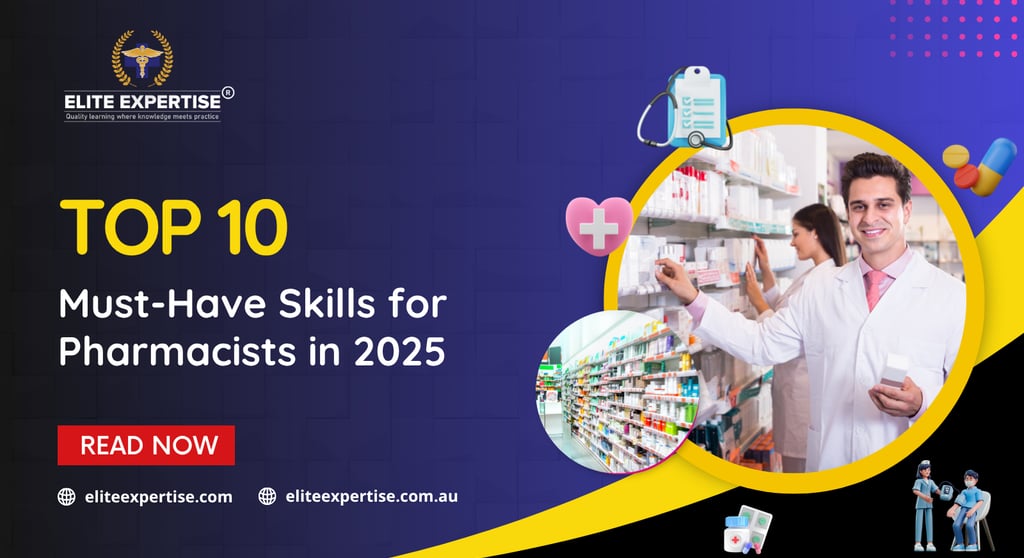ASK MY PHARMACIST | GOT QUESTIONS? Your pharmacist has answers. Click Here
Top 10 Must-Have Skills for Pharmacists in 2025
Discover the top 10 essential skills every pharmacist needs in 2025, from clinical knowledge to tech proficiency-to thrive in the evolving pharmacy field.
Radhika
7/1/20254 min read


Pharmacy is a developing and demanding field with advancements around every corner with growing patient needs. As we look toward the future of the pharmacy profession, the skills for pharmacists in 2025 will extend far beyond traditional drug dispensing.
Today’s pharmacists are expected to be clinical experts, effective communicators, tech-savvy professionals, and compassionate caregivers. Here’s a comprehensive look at the top 10 essential pharmacist skills defining success for the future of pharmacy profession.
1. Clinical Knowledge & Pharmaceutical Expertise
A strong foundation in clinical knowledge and pharmaceutical expertise remains at the core of the pharmacist job skills.
Pharmacists must stay updated on the latest drug therapies, pharmacogenomics, and evidence-based treatment guidelines. With the rise of personalized medicine and complex therapies, the ability to make informed clinical decisions and optimize medication regimens for diverse patient populations is more critical than ever. This expertise ensures safe, effective, and individualized care.
2. Communication Skills
Clear and effective communication is one of the most in-demand pharmacist skills in 2025. Pharmacists must know how to explain medication usage, potential side effects, and complex medical information to patients in an understandable way.
A pharmacist also interacts with people who view their illnesses differently. Every situation needs to be dealt with empathetically, understanding the patient's needs. This is why interpersonal skills are important.
Remember, it is good to have strong verbal and written communication. If you are looking for pharmacist employment opportunities in Australia or New Zealand, you need to be proficient in English communication. Elite Expertise offers PTE preparation courses that help you clear the language test.
3. Must Have Attention to Detail
The healthcare industry requires patience, knowledge, but most importantly, attention to detail. When working with patients every day, this skill is essential not only to provide accurate diagnosis or dispense the right medication, but also to maintain patient records and be meticulous in administrative duties, ensuring patient safety.
👉 Also Read : How to become a pharmacist in Australia for international students
This meticulousness extends to monitoring drug interactions, allergies, and contraindications, making precision a non-negotiable skills needed to be a pharmacist.
4. Problem-Solving & Critical Thinking
The future pharmacist's role demands advanced problem-solving and critical thinking abilities. Pharmacists often encounter complex clinical scenarios, such as medication shortages, adverse drug reactions, or unique patient needs.
The ability to analyze situations, weigh options, and develop effective solutions is vital for navigating these challenges and delivering high-quality patient care.
5. Ethical Judgment and Integrity
When dealing with patients every day, it can be tricky to diagnose accurately, especially with patients with special conditions.
Therefore, ethical judgment and integrity are fundamental. Pharmacists are entrusted with critical and sensitive information. They have to ensure that the patient is safe and the information remains confidential, which is why analytical ability can help identify issues accurately.
These abilities help understand patient history, offer solutions, and advise patients properly. A pharmacist being good at analysis, judgment, recognizing medication-related effects, and upholding ethical standards builds trust within the community and the patients. These values define pharmacist career trends in a patient-centric era.
👉 Also Read : Best Pharmacy Courses to Boost Your Healthcare Career
6. Technological Proficiency
You don’t need to be tech-savvy to be a pharmacist; however, you need to be proficient in handling pharmacy technology skills that hold patient records, automated dispensing systems, and other forms of data. It also streamlines patient care and safety.
Additionally, you need to have an understanding of finance, as it helps plan the budget, customer payments, and spending across departments. Moreover, it helps maintain financial records with insurance companies.
7. Time Management & Multitasking
Pharmacists have to take multiple roles if they feel. Yet, they must perform tasks efficiently and prioritize in order to provide services on time.
Managerial tasks are the priority if they are working in a hospital or a pharmacy to supervise the employees, manage the patients, and keep the records.
Efficient use of time in healthcare is a necessity, where a pharmacist has to fulfill the prescription, talk with patients, lead the team, and at the same time perform administrative duties. These multitasking abilities define modern pharmacist job skills.
8. Empathy & Patient Care
Empathy, trust, and confidentiality constitute patient-centered care. Pharmacists need to have a psychological insight into patients and then support them in their emotional needs.
Particularly when people with chronic diseases or who receive difficult diagnoses. This can start by showing empathy, listening actively, and if the patient's culture is different, handled differently.
More importantly, confidentiality is an ethical obligation of a pharmacist. A pharmacist is the person who holds the private information about a client's medical history, medications that the client is taking, and keeps it confidential, unless there is a legal necessity to disclose this information.
9. Teamwork & Collaboration
Pharmacists must collaborate with every member of the team. Good teamwork and cooperation with doctors, nurses, and other healthcare professionals improve medication management and patient outcomes.
The skill to collaborate with different teams harmoniously is an important skill that a pharmacist requires in the changing healthcare environment.
10. Commitment to Lifelong Learning
Learning doesn’t stop when you are in healthcare. The future of pharmacy changes constantly, and it is key to remain abreast of the latest treatments, regulatory changes, and technological developments.
It is equally important to remain calm and patient with people because every person is different and will have a different diagnosis. This is why learning in this regard about patient empathy will help you remain relevant, knowledgeable, and adaptable throughout your career. Enrolling in platforms like Elite Expertise is a great step toward continuous personal and professional growth.
Conclusion
As the pharmacy profession transforms, so does the need for skills that pharmacists will have in 2025. Skills such as clinical expertise, technological skills, empathy, and ethical judgment are the essential pharmacist skills that form the basis for a fulfilling and beneficial career.
It becomes necessary to embrace growth, allowing pharmacists to be successful in their jobs and have a significant impact on the lives of patients.


About the Author
Radhika
Content Writer | Elite Expertise
Radhika loves all things content! With a Master's in English Literature and over 4 years of experience in digital strategies. She specializes in creating engaging content across diverse industries - including healthcare, technology, and e-commerce - always writing content that connects to its readers.
Follow On
Follow Us
+91 76750 84909
Privacy Policy | © 2025 Elite Expertise . All Rights Reserved.
ELITE EXPERTISE PTY. LTD (ABN: 15668292439) (ACN: 668292439)
Australian Statutory Education License: OPP 2025 ELITE EXPERTISE PTY. LTD
Disclaimer
Elite Expertise is an online education platform dedicated solely to providing coaching and preparation services for the OPRA, PEBC, PSI and PTE exams. We do not offer any sponsorship or migration services. All information provided on our platform is for educational purposes only and should not be interpreted as legal or immigration advice. For inquiries regarding sponsorship, visa applications, or migration services, please consult with licensed immigration professionals or relevant authorities.
Elite Expertise is a trusted and results-driven training platform specializing in preparation for international pharmacist licensing exams. Our comprehensive courses, expert instructors, and proven methodologies have helped countless pharmacy professionals achieve their goals and succeed in competitive regulatory exams. We are proud of our strong success rate and commitment to excellence.
Elite Expertise is an independent training provider. We are not affiliated with any global pharmacy regulatory authorities or official exam-conducting bodies.
Copyright © 2026 Elite Expertise. All rights reserved.
Address
Unit 1/73 Beverley St, Doncaster East VIC 3109, Australia
